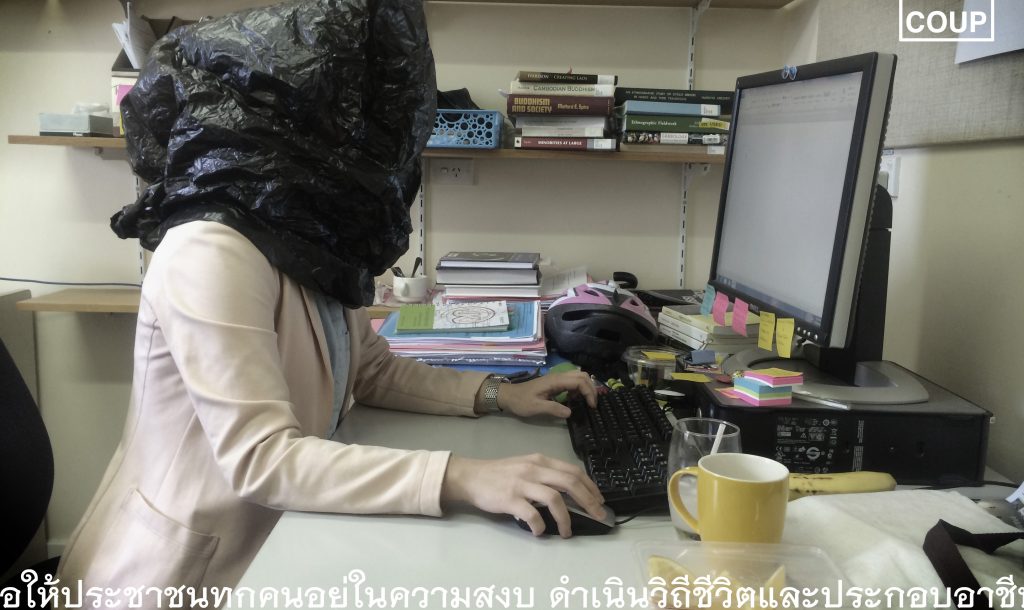There is an information war in Thailand.
The military began shutting down normal programming on cable and some satellite TV channels as well as radio stations and instructed those on social media to be very careful – all done before the coup declaration. Unlike in 2006, the last coup, the men in uniform made strong and explicit statements to both the traditional and new media producers and consumers to watch out for their action. Although martial law is normally accompanied by the restrictions on freedom of press and speech, the military imposed a near total ban on the media, and held ISP executives responsible for what would go on online.
Little is coming out in Thailand these days when it comes to political news. The army chief, Prayuth Chan-Ocha, demanded public TV channels to only show news from the military-approved sources. Repeat re-runs of the military’s announcement was what many Thais are seeing on their TV. The “lack” of news is frightening at a time when people are wondering what is going on. While most Thais are used to curfew – there had been so many in this past decade alone – having some sense of what is going on could help ease the minds of Thais while they have been ordered to stay at home.
What is the military afraid of? The answer is simply not just the dislodged Pheu Thai party, nor the feuding political elites. After all, despite what the army chief claimed as “no end in sight,” some “deals” could be made among the elites, especially after an already weakened ruling party following the ousting of its leader Yingluck Shinawatra. Although part of the reason for a quick way out was to ensure some resolution could be achieved before Prayuth could retire in September. Yet, the very short time between the declaration of martial law and the coup did not allow enough time for negotiation to materialize before the military concluded it would take over. It all seemed as though getting the key factions to agree with one another was not the major part of the plan.
Part of the military’s fear is “propaganda to elicit violence by ill-intent individuals.” The military believes there exist “underground” groups in Thailand bent on wreaking havoc in the country and they worry unless they control and centralize the dissemination of information, they would not win this battle. It’s not just the battle between the Shinawatra versus the Rest, but rather, between the state and its “subversives.”
Already since the martial law was imposed, the security forces had begun arresting suspected individuals and turned up reportedly military-grade weapons. Some of these were believed to have belonged to individuals with ties to the warring protest movements.
Of the 19 official statements made by the newly formed National Peace and Order Maintaining Council (NPOMC), 6 of them were specifically targeting at information control. The military reasoned the need to control TV, radio stations and the Internet as a way to ensure “truthful” and “correct” information get disseminated to the population. The NPOMC was most worried about the social media communication, where they have the least direct control, that non-censored information could pose further challenge to the military rule and the state, more generally. The military pleaded then demanded cooperation from the media and those involved (vaguely defined) to ensure controlled information.
According to the 17th statement by the NPOMC, the army chief placed the responsibility of monitoring the Internet largely on the providers:
“In order to disseminate proper Internet news to the population – void of manipulation that could create misunderstanding or conflict…the Internet providers must:
1) monitor and stop any information dissemination that could breed disorder within the Kingdom or would negatively impact the stability of the state and the morale of the people
2) be summoned for a meeting at the Office of the National Broadcasting and Telecommunications Commission….”
Was the military takeover of the media warranted? The coup in 2006, while the military imposed certain restriction on freedom of press, it did not result in this level of information lock down. Many of the commercial TV channels in Thailand were hardly political: they mostly showed soaps, game shows and music videos. Perhaps the near ban on media was a sweeping act of fear mongering. Or perhaps the military believe it could really suppress the voices of its opposition. Either way it’s unsustainable.
 Facebook
Facebook  Twitter
Twitter  Soundcloud
Soundcloud  Youtube
Youtube  Rss
Rss 